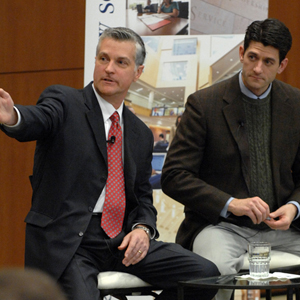Of Paul Ryan and Buggy Whips
 First of all, I have to admit that my prediction was wrong. I predicted that Paul Ryan would not be the Republican nominee for Vice President in 2012. My reasoning was simple: I didn’t believe that Mitt Romney would risk being overshadowed by his running mate on questions of economic policy. However, Mitt Romney did indeed choose Paul Ryan as his running mate late last Friday, thus demonstrating that he is comfortable running for President on a fiscal blueprint that is known as “The Ryan Plan” rather than “The Romney Plan.”
First of all, I have to admit that my prediction was wrong. I predicted that Paul Ryan would not be the Republican nominee for Vice President in 2012. My reasoning was simple: I didn’t believe that Mitt Romney would risk being overshadowed by his running mate on questions of economic policy. However, Mitt Romney did indeed choose Paul Ryan as his running mate late last Friday, thus demonstrating that he is comfortable running for President on a fiscal blueprint that is known as “The Ryan Plan” rather than “The Romney Plan.”
The selection of Paul Ryan immediately transforms the presidential race, turning it from an up or down referendum on President Obama’s performance into a choice between two starkly different views of economic policy. The Republican Party, which proudly labels itself a “brand,” will now embark on an effort to sell a plan that includes tax cuts for the wealthiest Americans, reductions in monies spent on programs that benefit low income Americans, and the acceptance of unrestrained budget deficits because defense spending is left untouched. The sales pitch is that this combination will lead to a faster economic recovery. The question is whether anyone will buy what they are selling.


